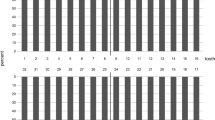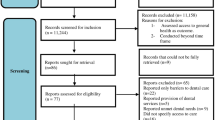Abstract
This study was conducted to detail tooth loss patterns in older adults with special needs. A total of 491 elderly subjects with special needs were retrospectively selected and followed during 10/1999‐12/2006. Medical, dental, cognitive, and functional assessments were abstracted from dental records and used to predict risk of tooth loss. Tooth loss events were recorded for subjects during follow‐up. Chi‐squared tests were used to study the association between tooth loss and the selected risk factors. Logistic, poisson, and negative binomial regressions were developed to study tooth loss patterns. Overall, 27% of the subjects lost at least one tooth during follow‐up. Fourteen subjects had tooth loss events per 100 person‐years. Tooth loss pattern did not differ significantly among different special‐needs subgroups (i.e. community‐dwelling vs. long‐term care, physically disabled vs. functionally independent). Special‐needs subjects with three or more active dental conditions at arrival had more than twice the risk of losing teeth than those without any existing conditions. After adjusting other factors, the number of carious teeth or retained roots at arrival was a significant predictor of tooth loss for older adults with special needs (P=0.001). These findings indicate that appropriately managing active caries and associated conditions is important to prevent tooth loss for older adults with special needs.
Similar content being viewed by others
Article PDF
Author information
Authors and Affiliations
Corresponding author
Rights and permissions
About this article
Cite this article
Chen, X., Clark, J. Tooth loss patterns in older adults with special needs: a Minnesota cohort. Int J Oral Sci 3, 27–33 (2011). https://doi.org/10.4248/IJOS11012
Received:
Accepted:
Published:
Issue date:
DOI: https://doi.org/10.4248/IJOS11012
Keywords
This article is cited by
-
Assessing the effects of oral health-related variables on quality of life in Taiwanese adults
Quality of Life Research (2013)



